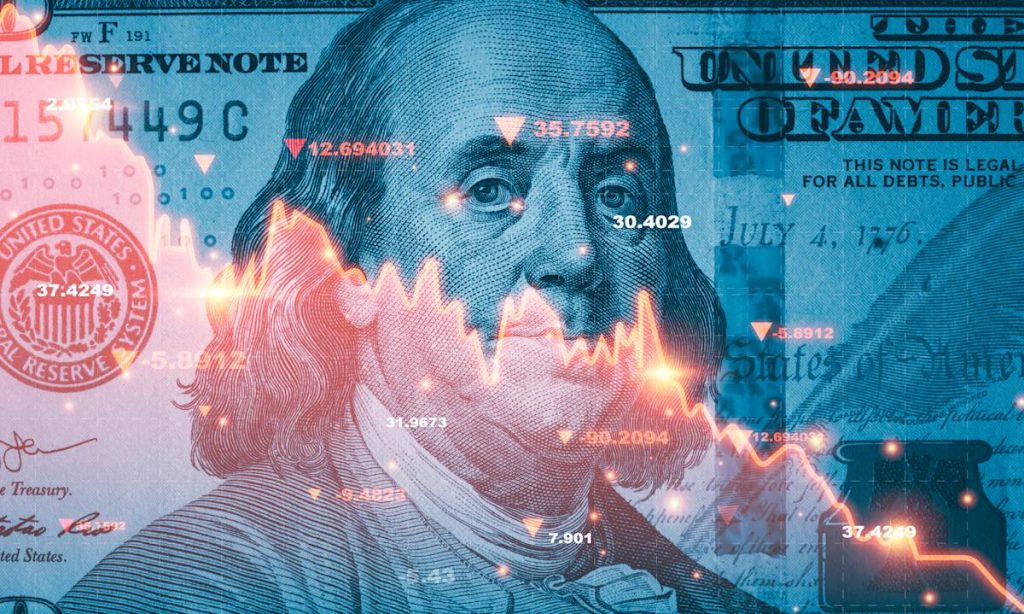
Financial security is always important, but it becomes a top priority during times of economic uncertainty. Besides reworking your budget and reducing your spending amid recession concerns, you could be wondering if taking out a personal loan makes sense to help stabilize your cash flow. Unfortunately, the answer isn’t black and white — it depends on your situation.
Here’s what to know about borrowing during a recession, the potential drawbacks of doing so, and when it might make sense.
A recession is an economic contraction marked by declines in the gross domestic product, high unemployment levels, and lower spending. During a recession, business activity slows due to lower consumer demand, and some businesses might lay off workers or shut their doors entirely. This kind of slowdown can make it difficult to find a job or make ends meet. Thus, consumers often tighten their belts and put off larger purchases or home projects during a recession.
Recessions typically happen due to economic or political instability at home or abroad. A country could also experience a recession because of an unprecedented event like a pandemic.
The Federal Reserve typically steps in to help stabilize the economy during a recession. Generally, it lowers the federal funds rate — the rate that banks and credit unions pay to lend to other financial institutions. Decreasing this rate encourages lenders to reduce their loan rates as well, ultimately lowering borrowing costs for consumers and businesses.
You might secure a lower rate on a personal loan if you borrow during a recession than you would during a time of economic stability. That said, it’s still important to shop around for a loan if you’re planning to borrow. Lenders offer different rates and loan terms for personal loans, so comparison shopping will help you find the best option.
A lower loan rate can be a good thing, but there are also potential drawbacks to borrowing during a recession or any time of economic instability. Here are some common ones:
-
Job security: Your employment could be vulnerable if the economy tanks. While nobody can predict whether a company will lay off workers, a recession increases this possibility. An unexpected blow to your household income could have a serious impact on your family’s financial security. Hiring also typically slows down during this time, making it harder to find a new job if you’re suddenly unemployed.
-
Increased expenses: Taking out a loan means an additional monthly payment, which could be difficult to manage if your household income decreases due to job loss or cutbacks at work. Think carefully before you increase your monthly expenses during periods of economic uncertainty. If you’re unable to make your monthly loan payments or pay late, it could have harmful consequences for your credit.
-
Difficulty getting a loan: Banks and financial institutions might also be more reluctant to lend during a recession, or they may impose stricter requirements for borrowers. You’ll need to prove you have consistent income and relatively low existing debt to qualify for a personal loan.
Borrowing during a recession comes with risks, but it could make sense if you have stable employment and want to consolidate high-rate debt. For example, taking out a personal loan to repay credit card debt might save you money on interest costs in the long run.
Likewise, if you need to cover an unexpected expense and can comfortably afford the monthly payment on a personal loan, borrowing could help you avoid a significant up-front cost. Personal loans typically have terms of two to seven years, so you’ll have more financial flexibility to pay down a large expense over a longer time frame.
As you consider whether it makes sense for you to take out a personal loan during a recession, assess your current employment and financial situation. You’ll also want to review your budget to determine if you have room for another monthly payment.
You can take steps today if you’re worried about an economic downturn in the near future. Focus on padding out your emergency fund, so you’ll have an extra cushion if your income does take a hit. Pay down high-interest debt, such as credit cards, that may be weighing down your budget. And if job loss is a possibility for you, consider diversifying your income stream by picking up side hustles or starting your own small business.
This article was edited by Alicia Hahn.

